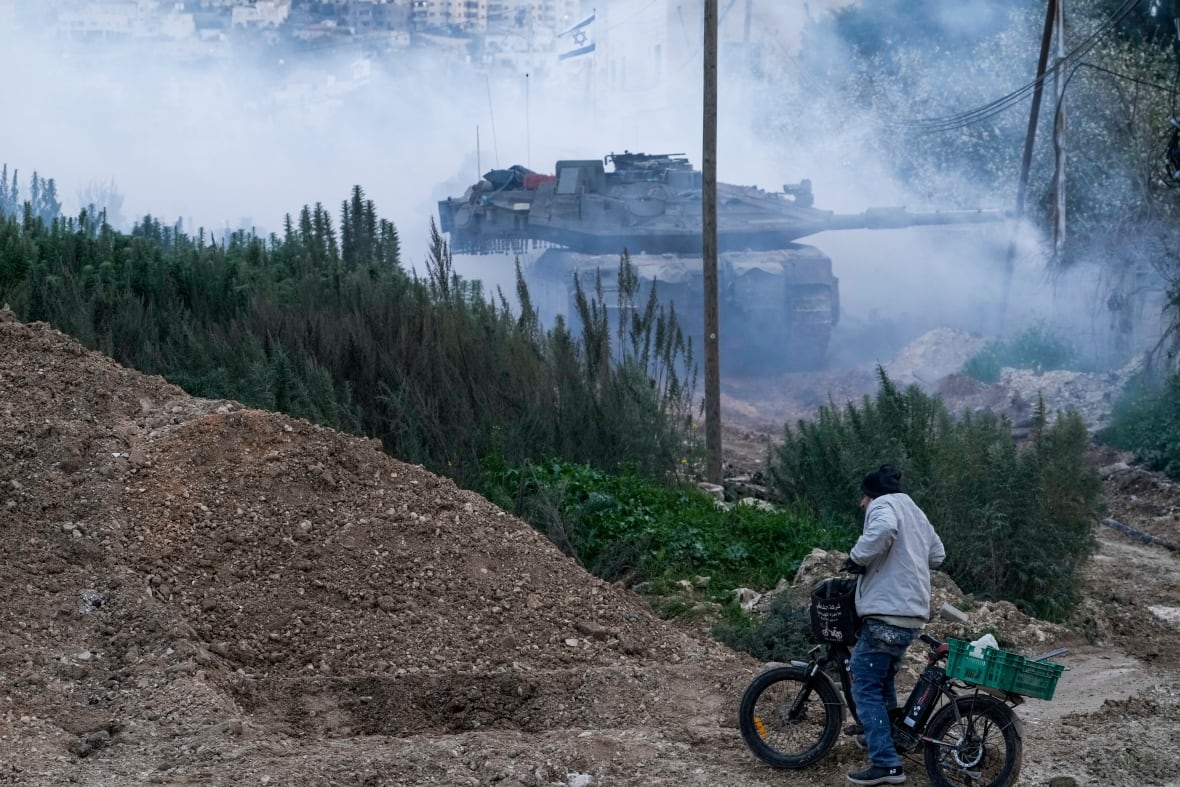Israeli tanks moved into the occupied West Bank for the first time since 2002 on Sunday, shortly after Israel’s defence minister said troops would remain “for the coming year” in parts of the Palestinian territory.
Associated Press journalists saw a handful of tanks move into Jenin, long a bastion of armed struggle against Israel.
Israel is deepening its crackdown on the Palestinian territory and has said it is determined to stamp out militancy amid a rise in attacks.
Israel launched the broad offensive in the northern West Bank on Jan. 21 — two days after the current ceasefire in Gaza took hold — and expanded it to nearby areas.
Palestinians view such raids as part of an effort to cement Israeli control over the territory, where three million Palestinians live under military rule. The deadly raids have caused destruction in urban areas.
Israeli Defence Minister Israel Katz said he and Israeli Prime Minister Benjamin Netanyahu had ordered the military to “increase the intensity of the activity to thwart terrorism in the Tulkarem refugee camp and in all refugee camps” in the West Bank.
Katz earlier said he instructed the military to prepare for “an extended stay” in some of the West Bank’s urban refugee camps, from where he said about 40,000 Palestinians have fled — a figure confirmed by the United Nations — leaving the areas “emptied of residents.”
The camps are home to descendants of Palestinians who fled or were forced to flee during wars with Israel decades ago.
It was not clear how long Palestinians would be prevented from returning. Netanyahu said Israeli forces will remain “as long as needed.”
Tanks were last deployed in the territory in 2002 when Israel fought a deadly Palestinian uprising.
The Palestinian foreign ministry called the Israeli moves “a dangerous escalation of the situation in the West Bank,” and urged the international community in a statement to intervene in what it termed Israel’s illegal “aggression.”
Netanyahu under pressure to crack down
Under interim peace agreements from the early 1990s, Israel maintains control over large parts of the West Bank, while the Palestinian Authority administers other areas. Israel regularly sends troops into Palestinian zones but typically withdraws them once missions are completed.
The UN says the current Israeli military operation is the longest since the Palestinian uprising of the early 2000s.
Violence has surged in the West Bank throughout the Israel-Hamas war in Gaza. Israel has carried out raids, but with fighting in Gaza and Lebanon on hold, Netanyahu has been under pressure from far-right governing partners to crack down on militancy in the West Bank.

More than 800 Palestinians have been killed in the West Bank since the war in Gaza erupted on Oct. 7, 2023, with a Hamas attack on southern Israel. Israel says most were militants, but stone-throwing youths protesting the incursions as well as people not involved in confrontations have also been killed. In the most recent operation, a pregnant Palestinian woman was killed.
Jewish settlers also have carried out rampages in Palestinian areas in the territory. There has also been a spike in Palestinian attacks emanating from the West Bank. On Thursday, blasts rocked three empty buses in Israel in what police view as a suspected militant attack.
Israel delays release of Palestinian prisoners
Israel captured the West Bank, Gaza and East Jerusalem in the 1967 Mideast war.
The West Bank raids come at a sensitive time, as the Jan. 19 truce between Israel and Hamas in Gaza remains tenuous.
Israel said early Sunday it was delaying the latest release of hundreds of Palestinian prisoners and detainees until it gets assurances that Hamas will stop what Israel calls “humiliating” handovers of hostages.
The 620 prisoners should have been released shortly after six Israeli hostages in Gaza were freed Saturday — five of them in staged ceremonies criticized by the U.S. and Red Cross as cruel.
Hamas on Sunday condemned Israel’s decision to postpone the release, saying its claim that the hostages’ handover ceremonies are “humiliating” is false and a pretext to evade Israel’s obligations under the Gaza ceasefire agreement.
Ezzat El Rashq, a member of the Hamas political bureau, said the ceremonies do not include any insult to the hostages, “but rather reflect the humane and dignified treatment of them,” adding that the “real insult” is what the Palestinian prisoners are subjected to during the release process.
#Israeli #tanks #move #occupied #West #Bank #1st #time












Leave a Reply